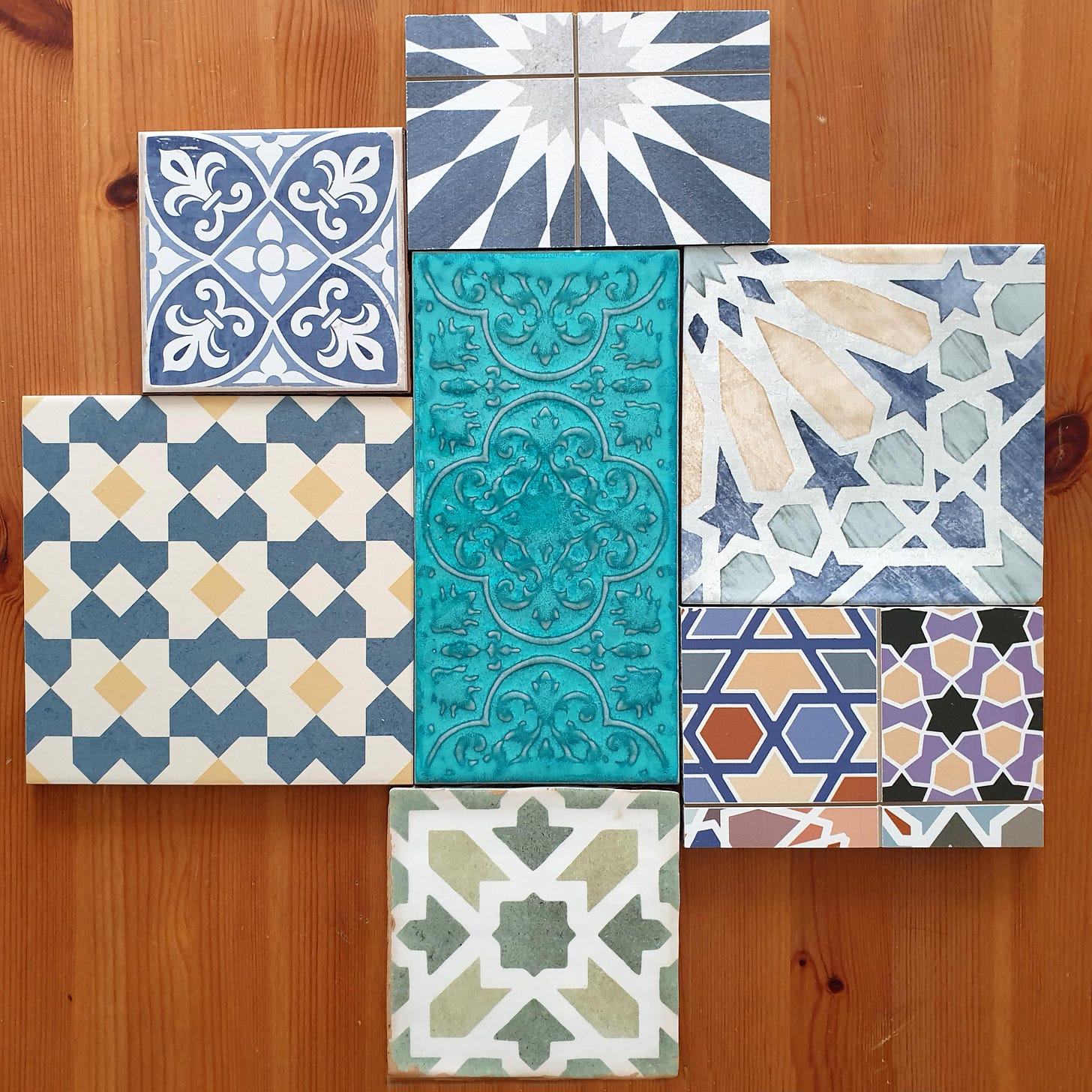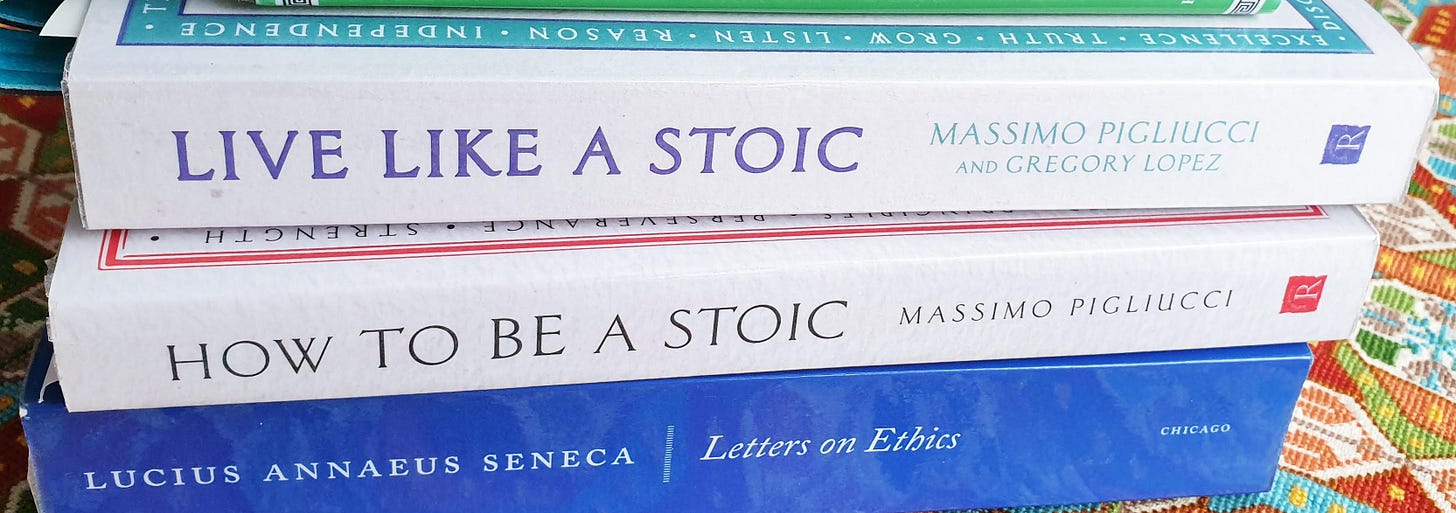Mosaic pieces
The memoir writing paradox and more lessons for a Stoic life
Writers often say that a story won’t let them rest, it urges them to bring it to the world, it pounds against the walls of her cell, demands to be let out. The struggle is very real - but for memoir writers the difficulty is compounded: I have the overwhelming urge to tell the stories (for there are many), to meet my younger self and those long dead on the page, to work out what we did to ourselves and each other and why - perhaps, to find some resolution. But telling the stories means telling my own truth: precisely what I haven’t been able to do since…well, for as long as I remember myself.
It is joy to be hidden and disaster not to be found
D W Winnicott
I call it the paradox of the memoir writing life.
I had a dismissive, emotionally immature mother - there, I’ve said it. Or rather, written it, since I’ve said it may times. Writing it gives it some permanence and brings up some guilt. I can almost hear her voice: “I gave up the best years of my life for you, and this is how you repay me? Write lies about me and get strangers to read it? But you were always seeking attention - what else could I expect from you?”
I grew up believing the following, never questioning them until two years ago, when I was brought face-to-face with my mortality.
She is my mother, so she knows what she is doing.
She is my mother, so she must be right: I am not good enough and never will be.
She is my mother, but doesn’t love me.
Here’s the conundrum: since early childhood I was met with dismissal and rejection. I carried a huge amount of anger towards her. Maybe I had to nurture the anger, so that I could leave Greece and follow a different path. But I couldn’t move away from the basic assumptions and the grief. I still shy away from the spotlight towards the safety of the shadows. I still fear to be read.
Where does the root of this fear lie?
I am now exploring Bethany Webster’s Discovering the Inner Mother. I am taking it slowly, journaling when I need to as I go along. I wonder whether pushing through the discomfort may, in time, resolve this paradox and remove the writing block.
Have you experienced this paradox, or any other? How are you coping (or not) with it?
And the rest of the strands
Memoir and Life Writing Group
The seven-week Memoir Summer Stream at The London Writers’ Salon came to an end on 25th August. It has been an enlightening experience, and I am grateful to my fellow writers for giving me the opportunity to learn so much from them, and for their insightful feedback, in summary:
Smaller, more private and more committed group
Shorter length of commitment (pods?)
Shorter session length
If you’d like to check out our supportive group, visit LWS, Memoir and Life Writing group. The next community meeting is on Thursday 15 September, 5-6 pm BST.
If you would like to join hundreds of other writers writing in community, join the free Writers’ Hour; one of the four daily sessions is bound to fit in with your daily schedule.
…and the long haul project
52 weeks to a good life
Our friendly, wise, supportive community at the Stoic Salon is now seven months into the book Live Like a Stoic: 52 Exercises towards a Good Life book, and has met live on zoom seven times so far. The authors Massimo Pigliucci and Gregory Lopez have joined us twice to answer questions from the community, once shortly after the beginning of our journey (26 February 2022) and once halfway in, on 23 July 2022.
Here follow my notes on the ongoing lessons of the last four weeks.
Week 29 – Review your actions nightly (15 August 2022)
This week’s lesson reminded me of reading this advice decades ago, probably as a teenager. Not that I ever practised it – I only recently adopted the nightly review (most nights) just before falling asleep, going over conversations and behaviours and trying to work out what I handled well and what I could have handled better. Here’s my check-out of my ‘performance’ against Seneca’s three points:
reflect on actions: probably partly achieved: I often reflect but not always
learn from mistakes: even less partly achieved, but I feel I am learning more with the passage of time, and as I am getting used to allowing myself time to reflect and learn
orient towards better conduct in the future: this is more of an aspiration. Seneca mentions that he ‘pardons’ himself for failings which I am finding hard to do for myself (still not quite developed the necessary self-compassion).
Eckhart Tolle says that change happens gradually: at the outset, an individual will realise what they did wrong long after the event; later, shortly after it; even later, just before they engage in the wrong behaviour, but they will do it anyway; eventually they will be able to catch themselves well before, and modify their reaction. It takes time, patience and self-compassion.
Week 30 - Do whatever political good you can (21 August 2022)
I took the term ‘political’ in its widest sense of doing some good in the world. Interestingly, this week I met up with a very old friend and a brand new one - and I use the term ‘friend’ advisedly in the light of our discussion of Seneca’s letter last week. It turns out that my old friend is in a situation I found myself in years ago in a close relationship. I shared my experience now, and after our discussion, my friend said that I had made her think. I hope that her reflection may help her towards finding some resolution in this most difficult relationship.
As for my new friend: we met at an online event of another community when we realized we are both writing our life stories which turned out to have a lot in common. After our meeting yesterday I felt that I got some good ideas from her, and I also shared some ideas on the process of writing.
All in all, this week I feel that I have made a little bit of difference in some people’s lives within my narrow remit, so on the whole it was a week well spent.
Week 31 – Act with reservation (28 August 2022)
This week’s lesson was two-fold for me:
Always predicate every plan with ‘fate permitting’, which I do anyway. My mother, a Greek Orthodox, always added prota o Theos (‘God first’ ie what He wants). The phrase seems to be quite ingrained in me, even though it now sounds old-fashioned. I suppose ‘Fate permitting’ of the Stoics sounds more stylish, but it is essentially another label for the ineffable truth.
I try to keep the image of the Stoic archer in mind: he has practised meticulously, slept well the night before the big competition, calmed his mind. Up to the point when the arrow is released, he has done everything under his control. But from the moment the arrow is released, he has no control any more: a tiny gust of air can cause the arrow to miss the target. At the beginning of the week, a lot of my headspace was taken up with the issue of my old friend. I thought that if somebody had spoken at the time, the relationship might have improved, possibly some resolution might have taken place. I felt torn between this thought and the fear of being considered a busybody; but then again, she had both spoken to me about this. I was only able to get it out of my mind after spending quite some time writing to both, going over the letters, and eventually pressing the send button. I feel I have done what I felt it was my duty to do in friendship. I have received no responses yet and I have no idea how my messages were received. But I am trying not to be attached to the outcome, and to rest in the awareness that I did what I thought I ought to.
Week 32 - Practise Stoic sympathy stealthily (4 September 2022)
A propos more Stoic work, do check out the Courageous Paths to Flourishing Women’s Stoicon Conference on 1 October, co-hosted by Kathryn Koromilas and Brittany Polat. Tickets can be booked here.





Sofia, thank you for your honest writing, there were so many things I wanted to write down and think about after reading your newsletter. When you outlined the why of your writing, " I have the overwhelming urge to tell my stories (for there are many); to meet my younger self, those long dead and those still alive on the page; to work out what we did to ourselves and each other and why; perhaps, to find some resolution." - I've never read a description about writing that so closely and eloquently describes the why of the process, it resonated so much, thank you. I'm really interested in Bethany Websters work and would love to hear more about your experience with that. I also found this exercise, from a short story workshop very freeing - it was to take a known person with a clear personality trait and trace back to the moment this trait began to appear and the why of it. I wrote a scene about my father as a little boy, it was imagined but based on real facts. The compassion I felt for him writing this was so deep, it was a powerful exercise and one I've repeated with other people if I'm ever in difficulty with them.
I agree with Jenny, such brave writing! Just reading this newsletter felt comforting and helpful so I can only imagine how reading your whole book would feel. Maybe have a younger you in mind who might be helped from reading it to keep you moving forward? And you are right, the only way is through (but with lots of support, breaks and treats I think ;). (Also, I love Bethany Webster, her course was quite life changing for me).